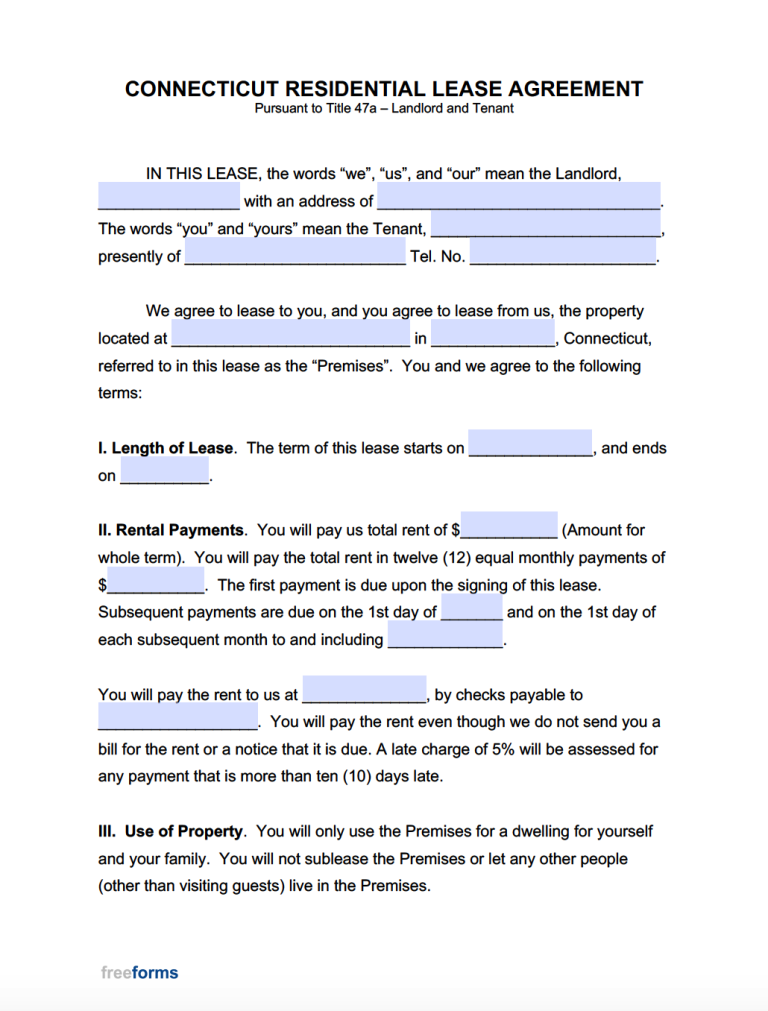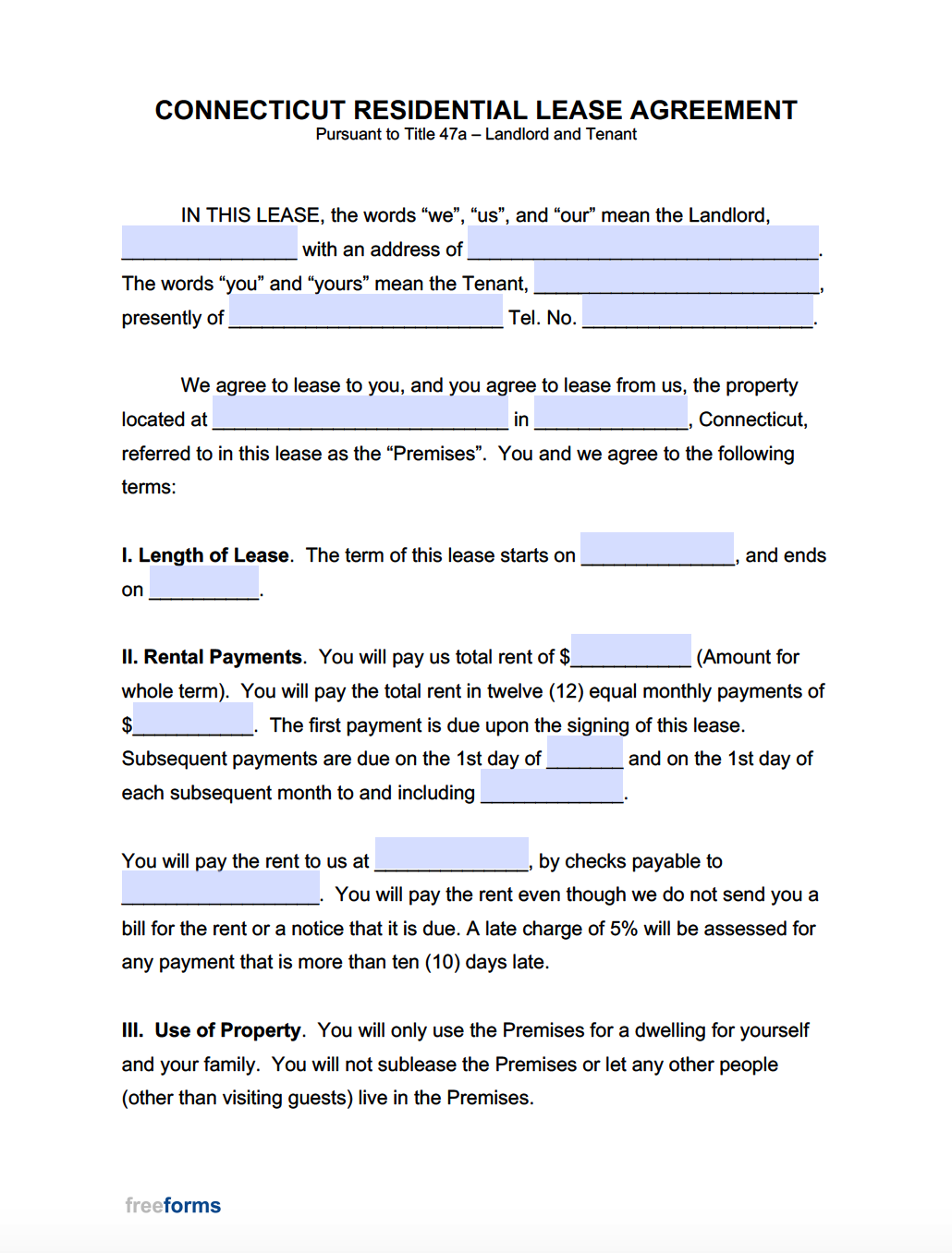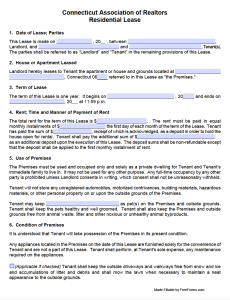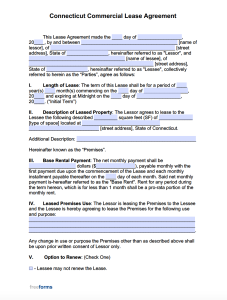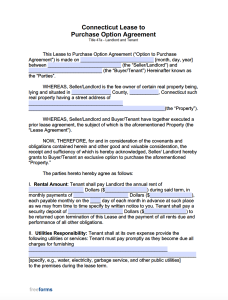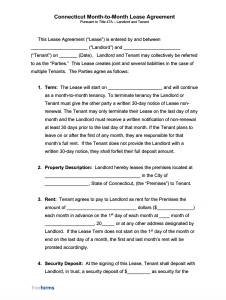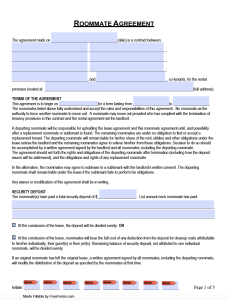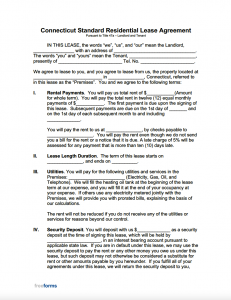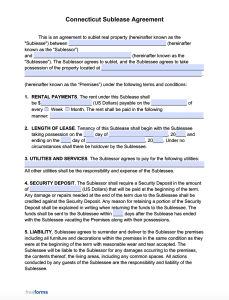Lease Agreements (7)
|
Download: PDF |
|
Download: PDF, Word (.docx) |
|
Download: PDF, Word (.docx) |
|
Download: PDF, Word (.docx) |
|
Download: PDF, Word (.docx) |
|
Download: PDF, Word (.docx) |
|
Download: PDF, Word (.docx) |
Required Landlord Disclosures
1.) Bed Bug Infestation (CT GS § 47a-7a(c)): If a landlord is looking to rent a dwelling that is currently infested with bed bugs, they must disclose this information to the potential tenant before entering into an agreement.
2.) Common-interest Communities (CT GS § 47a-3e): If the property is classified as a “common-interest community” (e.g., condominiums), the landlord must disclose this fact within the content of the lease agreement prior to the occupancy.
3.) Fire Sprinkler System (CT GS § 47a-3f): When renting a residential property, the landlord must provide the tenant with written information regarding the presence or absence of a fire sprinkler system, as well as any details concerning the date in which the system was last serviced and inspected (all info should be printed in a minimum font size of 12-point or higher).
4.) Identification of Landlord (CT GS § 47a-6): It is mandatory for the landlord (or authorized agent) to disclose in writing the current names and addresses of any individuals responsible for managing the premises, as well as any individuals who are permitted to receive notices, requests, or serve papers regarding the property.
5.) Lead-Based Paint (42 U.S. Code § 4852d): Property owners/landlords adhere to the law by disclosing possible lead paint risks.
6.) Standardized Rental Terms Summary Form (Conn. Pub. Acts No. 25-44, § 9(d)): Connecticut landlords must present the list with a summary disclosure of lease terms
When is Rent Due?
Late Fees
Connecticut explicitly allows for limited late fees after the grace period, specifically the lesser of:
- Five dollars per day, but this can not exceed 50$
- Five percent of the unpaid rent; however, tenants receiving federal housing aid pay five percent of their expected payment (CT GS § 47a-15).
NSF Fee
Security Deposit Maximum ($)
Landlords must account for a prospective tenant’s age in Connecticut since this determines a specific amount:
- Landlords can ask to two months’ rent for tenants under 62 years of age
- If the tenant is over 62 years old, the limit is one month’s rent (CT GS § 47a-21(b)).
Security Deposit Return
Landlord’s Right to Enter
Standard Entry: Landlords provide 48 hours’ notice before entry; however, there are some exceptions:
- An emergency
- Court Orders
- Reasonable Belief of Abandonment (CT Gen Stat §47a-16)
Emergency Entry: Landlords enter “in case of emergency” without issuing a 48-hour notice (CT GS § 47a-16).
Absence
Landlords assume a case of abandonment only when it is reasonable, for example:
- The tenant’s rent payment is at least two months overdue.
- The tenant’s furniture (e.g., beds, couches) is no longer present.
- There is a note from the tenant stating they are abandoning the premises (CT GS § 47a-11b).
Landlords (believing the tenant will not return) issue a 10-day notice, then reclaim the premises accordingly (CT GS § 47a-11b).
Repair and Deduct
Tenants with failures in essential services can obtain them when faced with landlord resistance, but they:
- Are not eligible if they or their guest is responsible for the loss of essential service (e.g., running water, heat)
- Must issue a 48-hour notice to repair or supply the essential service, which the landlord ignores or denies
- Can not spend more than the rent to obtain the essential service
- Must pay rent balance in addition to supplying receipts (e.g., a space heater purchase) (CT GS § 47a-13) (CT GS § 47a-12).
Tenant Breaking a Lease (Early)
Duty to Mitigate: Landlords hold the duty to mitigate their losses from a tenant’s abandonment or noncompliance (CT GS § 47a-11a).
Domestic Violence: Victims of domestic violence with fear of imminent harm terminate their lease with thirty days’ notice; however;
- The notice requires a formal statement (e.g., affidavit) explicitly stating the tenant’s fear of imminent harm.
- The landlord must receive proof within 30 days of the notice date (e.g., statement from the Office of Victims Services or police report).
- They pay for all back rent on their account.
- They reimburse the landlord for all damages they (the tenant) are responsible for (CT GS § 47a-11e).
Active Military: Connecticut generally depends upon federal laws allowing service members to terminate a lease whenever called to duty or reassignment (SCRA (50 U.S.C. § 3955)).
Uninhabitable Living Conditions: Tenants issue a 15-day notice to remedy or quit for serious lease violations (e.g., habitability, essential services, security (CT GS § 47a-12).
Landlord Harassment: Tenants reserve the right to seek damages for and an injunction for termination over landlord harassment (e.g., retaliation) (CT GS § 47a-18a)(CT GS § 47a-20).
Is an Oral Lease enforceable?
Renewing a Lease
There are no statewide rent control laws; however, Connecticut requires municipalities to have a fair rent commission. (C.G.S.A. § 7-148b).
Landlords must issue 45 days’ notice before a rent increase takes effect (House Bill No. 5474, Public Act No. 24-143).
Unclaimed Property
Landlords can reclaim the premises and are exempt from a notice to quit requirement if they specifically:
- Observe that a substantial amount of the tenants’ furniture is absent.
- Issue a belief of abandonment notice to the tenants’ last known address, but do not receive a reply.
- The rent is delinquent for at least two months. CT GS § 47a-11b.
